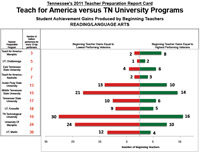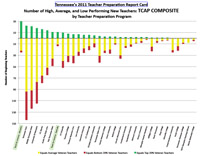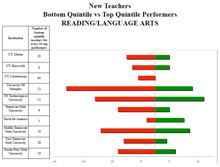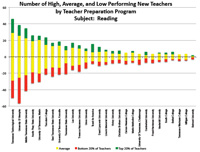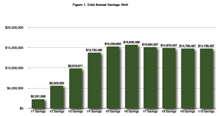Teaching is a highly trained and regulated profession; yet despite all of its rules, standards, enforcement agencies and oversight bodies, the performance of many practicing teachers is so poor as to be detrimental to students. The reason is that the evaluative process is largely controlled by the profession to suit its own standards—not those of the parents and taxpayers that it serves.
One effect of this self-regulated process is that the public’s priorities are not necessarily those of the profession.
In the view of the public, student learning is job #1. It is not the only important outcome of teaching but it is the indispensable one.
Public sentiment notwithstanding, fully trained teachers are often ill equipped to produce education’s primary product. The reason is that the preparation programs have other ideas which outcomes should take precedence.
The following reports are from Tennessee—one of the few states that objectively measures the classroom effectiveness of the state’s teacher preparation programs.
Number of High and Low Performing New Teachers from Tennessee’s Public Universities and Teach for America
According to the 2011 Report Card on the Effectiveness of Teacher Training Programs published by the Tennessee Higher Education Commission, teachers trained by Teach for America are significantly more effective than are the graduates of Tennessee’s publicly funded universities.
The good news is that all programs are turning out some exceptionally effective teachers but the bad news is that far too many beginning teachers are among the most ineffective in the state. Some programs are turning out 30 very ineffective teachers for every 10 that would qualify as very effective. The annual achievement test scores (i.e., TCAPs) of students taught by very effective teachers go up roughly 8 percentile ranks per year relative to other students. The scores of students taught by very ineffective teachers do the opposite. Go here to see how the program graduates compare in teaching reading, math, and overall (composite).
Number of High Performing New Teachers Entering Tennessee’s Schools
Tennessee’s Race to the Top Strategy calls for improving the effectiveness of new and veteran teachers. The data from Tennessee’s latest Report Card on the Effectiveness of Teacher Training Programs shows that some highly effective new teachers are being trained by the state’s programs but the vast majority of teachers trained in Tennessee are average and an alarmingly large number of them perform no better than the lowest performing veteran teachers now in the schools. Click here to see which programs are training the most and least effective teachers and where they are being hired.
Would Hiring New Teachers Improve Tennessee’s Schools?
The Tennessee State Board of Education has published the “2010 Tennessee Report Card on Teacher Preparation Effectiveness,” which highlights a gap between the effectiveness of our university-based teacher training programs and the efforts of private entities such as Teach for America. Go here to read a commentary by Dr. J.E. Stone, president of ECF, and review comparisons in the areas of mathematics and reading/language arts.
ECF Looks at Tennessee’s Report on Teacher Training Outcomes
For the past three years, Tennessee has published a report on outcomes from the state’s teacher training programs. The Education Consumers Foundation looks at how effective these programs are, and what can be learned from the differences found between programs. Click here for more.
Tennessee can save $121.7 million over the next 10 years with alternate certification
A new analysis commissioned by ECF shows that dramatic cost savings are possible through expanded implementation of Tennessee’s Transitional Teacher Licensure Policy.
Recent studies confirm that teachers who have been trained by programs such as Teach for America, the American Board for Certification of Teacher Excellence, and similar organizations are as effective in the classroom as graduates of traditional teacher education programs. By expanding implementation of its recently enacted policy, Tennessee can save $2.3 million in the first year and $121.7 million over the next decade.
To download the complete report, click here (note: 6MB file). An executive summary is available here.
ECF Proposes a Prioritized Teacher Rating System for Tennessee
As Tennessee works to create a new reporting model for teacher performance, ECF has proposed a consumer-friendly model approach that accommodates multiple measures while prioritizing those of greatest interest to the public. See its proposed model here.
ABCTE versus NBPTS
Two organizations offer advanced certification opportunities to teachers: the American Board for Certification of Teacher Excellence (ABCTE) and the National Board for Professional Teaching Standards (NBPTS). Dr. George Cunningham, a member of the Education Consumers Consultants Network (ECCN), compares the two and provides his analysis in this new brief.
Is certification by the National Board for Professional Teaching Standards worth the money?

States are awarding teacher bonuses of up to $7,500 per year, yet, seven studies since 2002 have found negligible results. See an annotated list of studies including the $63.17 million cost estimate for NBPTS bonuses in the South Carolina Budget. [from the Education Consumers ClearingHouse]

